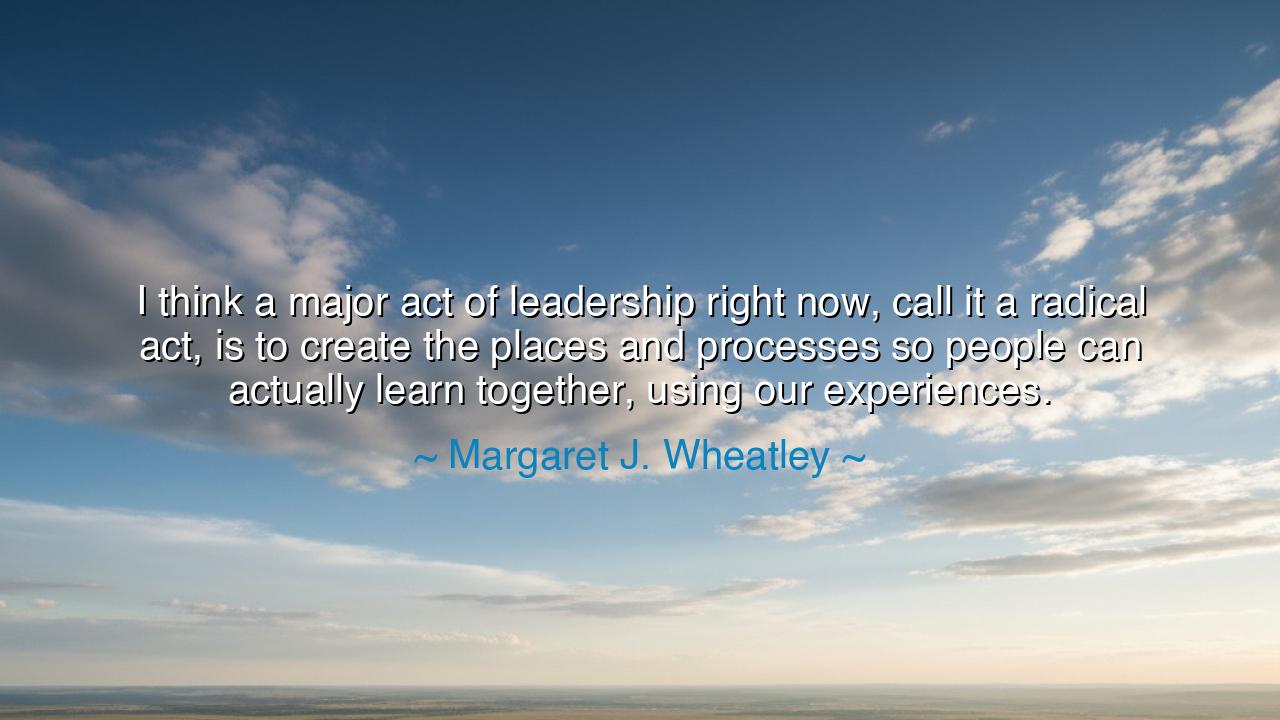
I think a major act of leadership right now, call it a radical
I think a major act of leadership right now, call it a radical act, is to create the places and processes so people can actually learn together, using our experiences.






Hear now the voice of Margaret J. Wheatley, who in her wisdom declared: “I think a major act of leadership right now, call it a radical act, is to create the places and processes so people can actually learn together, using our experiences.” These words, though spoken in our modern age, carry the cadence of timeless truth. For what greater gift can a leader offer than not command or control, but the sacred ground where hearts and minds may gather, where stories may be shared, and where wisdom is born through the weaving of many voices?
To call this act “radical” is to awaken us to how rare it has become. In a world of noise and division, true leadership does not shout the loudest nor impose its will with iron hands. Instead, it builds places—whether halls, councils, or even circles beneath the open sky—where people may come together not as rivals but as companions. It creates processes that give shape to listening, questioning, and growing. In such spaces, the walls of isolation crumble, and the strength of shared experience becomes the foundation of wisdom.
The ancients knew this path well. Recall the Agora of Athens, where citizens gathered to debate, to share, and to forge ideas that became the seedbed of democracy. There, in the clash and harmony of many voices, knowledge was sharpened, and leadership was not a solitary throne but a collective act of engagement. The philosophers did not teach in towers of isolation, but in the open air, where dialogue itself was the teacher. Wheatley’s words echo this ancient model, reminding us that to lead is not merely to speak, but to invite others into the circle of learning.
History too shows us this truth in the life of Nelson Mandela. When he emerged from the shadows of prison, he could have ruled South Africa with vengeance. Instead, he created places and processes—truth commissions, councils, dialogues—where people could face the past together, telling their stories of suffering and survival. In these gatherings, a wounded nation began to learn together, transforming pain into reconciliation. His act of leadership was indeed radical, for he chose not to dictate but to build the space where a people might heal and grow through shared experience.
The meaning of Wheatley’s words, then, is this: the greatest power a leader has is not the ability to command, but the ability to convene. In convening, we are reminded that every person carries a piece of truth, and only when these pieces are joined can the whole picture be seen. When we learn together, we discover not only knowledge but unity; not only solutions but understanding. This is leadership as service, leadership as stewardship, leadership as the act of planting the seeds of community.
The lesson for us is clear: do not imagine that leadership belongs only to those with titles or crowns. Each of us can practice this radical act. In your families, create places where stories may be shared openly. In your work, design processes that invite collaboration instead of competition. In your communities, gather people to reflect upon their experiences, not to divide, but to discover common ground. Wherever two or three are willing to listen and learn together, there lies the seed of transformation.
What, then, are the actions you must take? Begin by listening more than speaking. Invite others to share what they have lived, and honor their stories. Create spaces where trust may flourish—around a table, in a circle, in the quiet of shared reflection. Resist the temptation to dominate; instead, nurture the conditions where truth may rise from many voices. For in doing so, you embody the radical leadership Wheatley described: a leadership that does not demand followers, but cultivates fellow learners.
Thus let her words be remembered as a guiding torch: true leadership is not the command of the few but the communion of the many. To create places and processes where people may learn together is to strengthen the bonds of humanity itself. Do this, and you will leave not monuments of stone, but legacies of wisdom, planted in the hearts of those who come after you.






AAdministratorAdministrator
Welcome, honored guests. Please leave a comment, we will respond soon